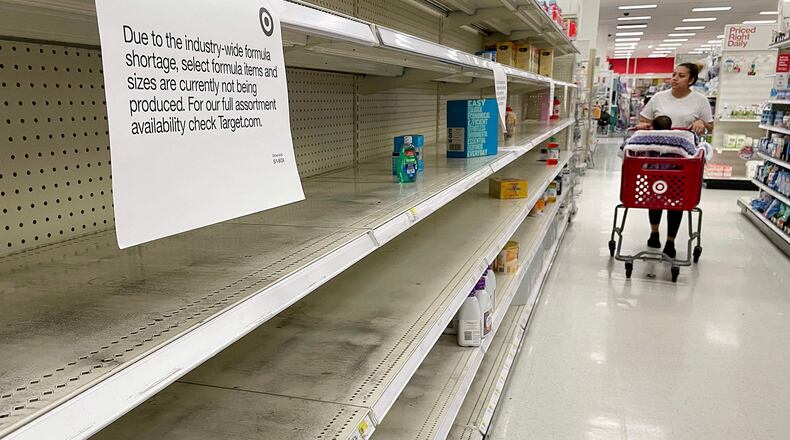A few Georgia children with complex medical issues were recently hospitalized at Children’s Healthcare of Atlanta because their families could not find the specific baby formula needed during a crippling nationwide shortage.
A spokesperson for Children’s said Thursday all the children hospitalized had specific dietary needs and any changes to their formula needed to be carefully monitored to make they could be well tolerated. It can be a long, complicated process to find a substitution that meets the children’s nutritional needs, and then make sure the new formula won’t trigger any negative and potentially dangerous reactions, such as dehydration or diarrhea.
The hospital declined to provide a specific number of children hospitalized, but said some were hospitalized back in February when a formula plant was closed, and others were hospitalized more recently as the formula shortage has worsened.
Children’s spokesperson said the hospitalizations included babies as well as older children and that all have since been discharged.
News of the local hospitalizations come as the baby formula shortage has reached a high pitch, with parents desperately looking for formula and stores depleted. White House and federal agencies this week have taken steps to restart the Abbott Nutrition’s Michigan formula plant, the largest in the U.S., which has been closed since February due to contamination problems. President Biden on Wednesday invoked the Defense Production Act to direct suppliers of formula ingredients to prioritize delivery to manufacturers. Even so, Abbott has estimated it could take at least two months for the supply to return to stores.
There have been reports of two children in Tennessee being hospitalized due to the shortage. According to a physician at Le Bonheur Children’s Hospital, both required a special amino-acid-based formula because they have short bowel syndrome, which prevents them from absorbing nutrients properly because part of their small intestine is missing, according to The Commercial Appeal.
While one was discharged Tuesday, the other remained at Le Bonheur in stable condition after receiving care for dehydration and complications from a lack of nutrients they would normally receive through specialized formula produced by Abbott Laboratories, the newspaper reported.
In Atlanta, Children’s staff works with groups such as home care agencies and federal programs such as the Special Supplemental Nutrition Program for Women, Infants and Children — known as WIC — to ensure supplies of new replacement formula were still available once the children went home.
Baby formula is critical to an infant’s development for mothers who cannot breastfeed or don’t produce enough milk for their babies. The shortage also impacts women who supplement breastfeeding with formula.
The U.S. Food and Drug Administration has specific guidelines on the manufacture of formula so that nutrients closely resemble a mother’s milk, making it difficult to duplicate with homemade sources. Infants generally stay on formula for the entirety of their first year. Parents begin adding baby food into their diets at about four to six months.
Credit: TNS
Credit: TNS
Pediatricians and health experts say there are options, but not every substitution will be right for every baby.
“This is certainly a challenging time for many parents,” said Dr. Stephen Thacker, a pediatric infectious disease specialist and associate chief medical officer at Memorial Health University Medical Center in Savannah. “It’s important for families to know that most children can safely switch to other formulas without any risk of harm. If your child needs a specialty formula, speak with your doctor to make sure you have a plan for your child should there be no more local supply.”
A Children’s spokesperson said parents struggling to find their child’s formula should call their obstetrician or pediatrician to see if they have in-office samples or can recommend a formula nutritionally similar to their young child’s typical formula that may be more readily available in stores.
Dr. Hugo Scornik, president of the Georgia chapter of the American Academy of Pediatrics, stressed parents should not water down formula, try to make their own off the internet, or give their infant cow’s milk – all of which can be dangerous.
Tips for coping with the baby formula shortage
Don’t water down baby formula
Watering down formula is dangerous. Extra water disturbs electrolyte and mineral balances such as calcium, sodium, and potassium, which can lead to major health problems including seizures
Don’t make your own formula
Although recipes for homemade formulas circulating on the internet may seem healthy or less expensive, they are not safe and do not meet your baby’s nutritional needs. Infant deaths have been reported from use of some homemade formulas.
Use cow’s milk only with caution
If your child is older than 6 months and is usually on regular formula (not a specialty product for allergies or other special health needs), this may be an option. Babies can be fed whole cow’s milk for a brief period of time until the shortage is better. For older babies, this is a better option than diluting formula or making homemade formula. Although the Academy of Pediatrics doesn’t have a specific amount of cow milk that infants 6-12 months should drink in this situation, follow the limits of no more than 24 ounces a day for children over a year of age.
Toddler formulas are not recommended for infants but ....
If you absolutely have no other choice, toddler formula is safe for a few days for babies who are close to a year of age.
Switch brands
For most babies, it is OK to switch to any available formula, including store brands, unless your baby is on a specific extensively hydrolyzed or amino acid-based formula such as Elecare, that has no equivalent store brand. Ask your pediatrician about recommended specialty formula alternatives available for your baby.
Source: American Academy of Pediatrics
About the Author
The Latest
Featured




